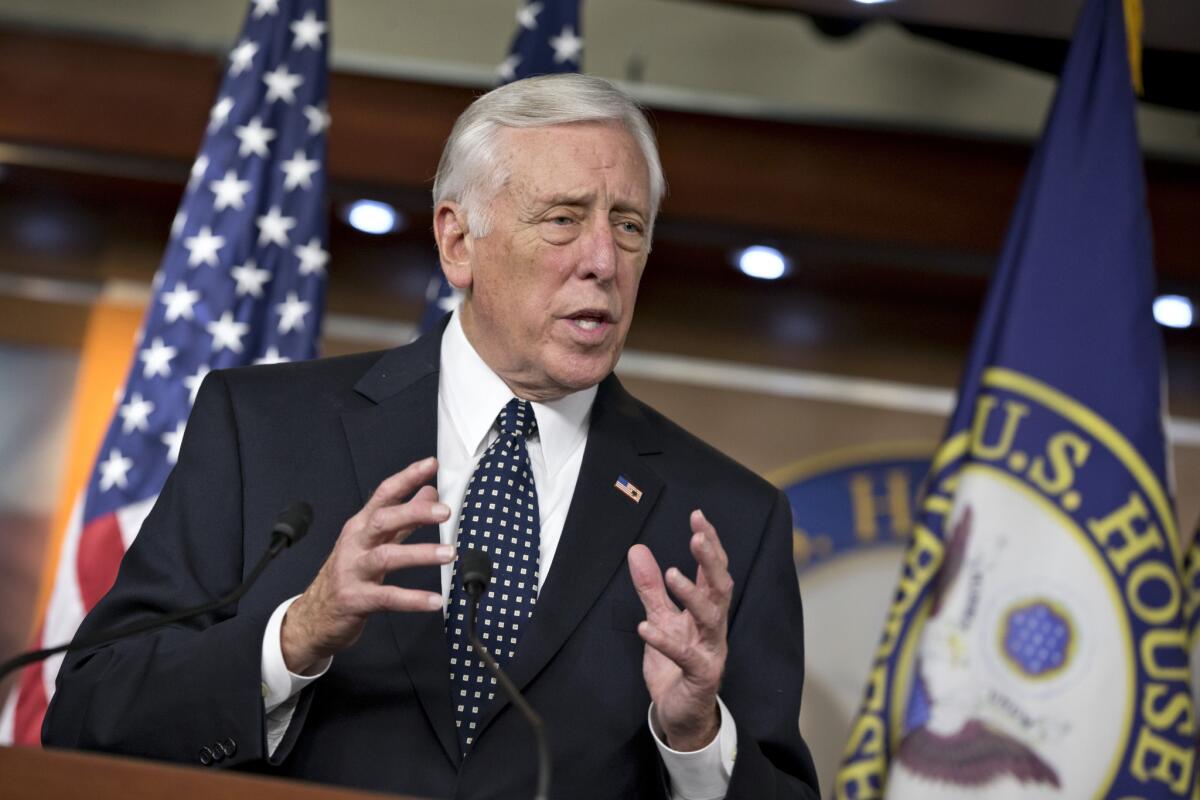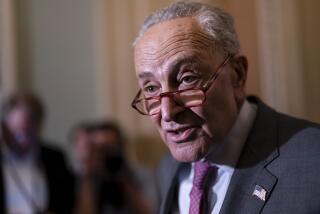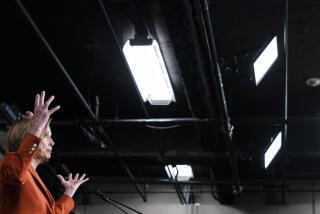House Democrats to vote on economic stimulus bill to combat coronavirus impact

WASHINGTON — Even as bipartisan talks continue over how Congress can respond to the economic fallout from the coronavirus, House Democrats said they plan to pass a bill as soon as Thursday that includes enhanced unemployment benefits, paid sick leave and a boost in the availability of food stamps — but without the big payroll tax cut President Trump wants.
House Democrats plan to release a bill late Wednesday, said Majority Leader Steny H. Hoyer (D-Md.).
The bill, which is likely to serve as an opening position in the bipartisan talks, is expected to hew closely to what Democrats have already outlined. It is unclear if the Trump administration or the Senate will support it.
House Speaker Nancy Pelosi (D-San Francisco) and Treasury Secretary Steven T. Mnuchin have begun negotiating a bipartisan package, though that legislation is expected to take longer. Pelosi informed Mnuchin about the House legislation Wednesday morning, Hoyer said.
By passing the House bill, Democrats may also hope to insulate themselves from public criticism that Congress is moving too slowly to respond to the health crisis. Lawmakers are scheduled to leave town Thursday afternoon for a weeklong recess.
The legislation is moving quickly and it is uncertain whether the Trump administration might support it. Senate Republicans huddled Wednesday and said they haven’t made any decisions on whether they will support the bill because they haven’t seen the specifics.
If it has the White House’s support, the Republican-controlled Senate may take up the bill with possible alterations or additions and quickly approve it. But given the few details surrounding the policy, few lawmakers on Capitol Hill on Wednesday were willing to predict how quickly it might move.
“It depends on what the House does,” said Sen. Mike Rounds (R-S.D.).
Rep. Tom Cole (R-Okla.) said the competing ideas — the White House has proposed a payroll tax cut that Congress quickly shot down — will merely slow down bipartisan talks.
“Right now it seems to me it’s sort of a Keystone Kops kind of process where everybody is throwing ideas out there one at a time,” he said. “There’s too much political angling going on here.”
Trump’s proposal to enact a payroll tax holiday to boost consumers’ paychecks has been all but ruled out by Democrats and Republicans in Congress in the short term. But Trump indicated he’d still like to see it in a bill.
“The payroll tax would be great. Democrats are not in favor of it. I’m trying to figure out why,” Trump told reporters during a White House meeting with the nation’s most powerful bankers.
Republicans aren’t that enthusiastic about a payroll tax cut either, as Democrats have noted.
“Neither we nor [House Minority Leader] Kevin McCarthy and the Republicans are very responsive or believe that is a very good suggestion,” Hoyer said, calling it a “nonstarter.”
Lawmakers are feeling pressure to act now before they leave for next week’s congressional recess.
“We should do something. None of us want to go home without doing something in addition,” said Rep. Donna Shalala (D-Fla.), a former secretary of the Department of Health and Human Services in the Clinton administration, referring to last week’s passage of an $8.3-billion plan to fund the federal government’s response to the virus. “But I’m worried about the economy. I’m worried about families.”
There are questions about whether the congressional break might be extended. While Pelosi has insisted that Congress won’t postpone future sessions if lawmakers need to act, Hoyer opened the door to the recess continuing if health experts recommend it.
“We’re making decisions on a day-to-day basis,” Hoyer said.
California Sen. Dianne Feinstein told The Times that she believes Congress should recess because of the virus.
“I’m just now coming to the conclusion that I think this place ought to be shut down,” Feinstein, 86, said in a brief interview in the Capitol. “It’s serious and it’s increasing,” she said of the number of confirmed cases.
Feinstein cited the close quarters of Capitol Hill’s 535 lawmakers and thousands of staff members and the fact that more than 100 visitors go through her office on an average day. As of Wednesday, the Capitol was still also packed with tourists shuttling through the hallways.
Temporarily closing the Capitol “sets an example. I think we’ve got to stop it,” she said, citing the uncertain path of COVID-19, the disease caused by the virus. “You have to aim to protect people.”
Times staff writer Noah Bierman contributed to this report.
More to Read
Get the L.A. Times Politics newsletter
Deeply reported insights into legislation, politics and policy from Sacramento, Washington and beyond. In your inbox three times per week.
You may occasionally receive promotional content from the Los Angeles Times.










